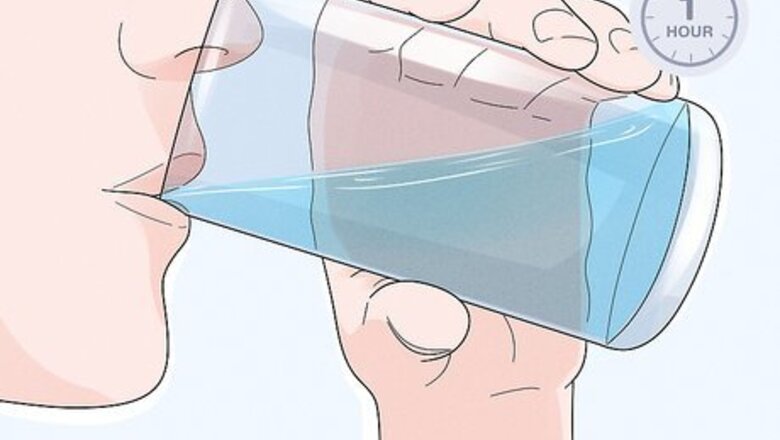
views
Staying Hydrated
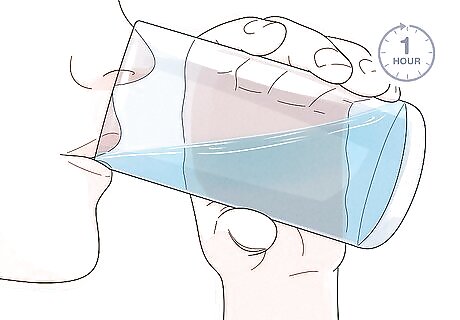
Drink a little bit at least once an hour. Vomiting and diarrhea can dehydrate you fast, so you need plenty of fluids to stay hydrated. However, don’t take big gulps all at once, especially if you're nauseous. This could make you vomit again. Instead, take small sips consistently, every 30-60 minutes. This helps keep you hydrated without making your nausea worse. Good drink choices include water, juice, diluted sports drinks, and seltzer. Try to avoid very sugary drinks like soda. These might taste good, but they can make your vomiting and diarrhea worse.
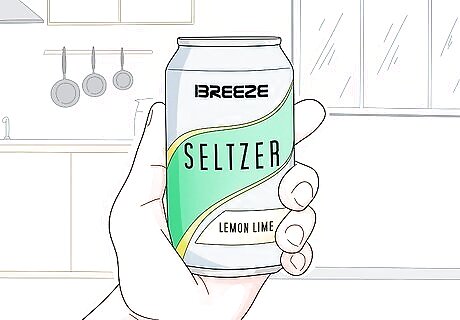
Sip on fizzy drinks if they make you less nauseous. Try drinking seltzer or ginger ale to stay hydrated and settle your stomach. You might find this more soothing than flat drinks.
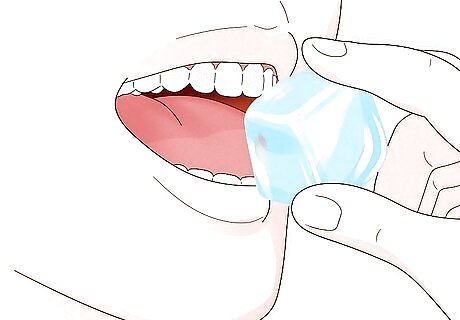
Suck on ice cubes if you have trouble keeping fluids down. If you’re very nauseous and can’t keep any fluids down, then this is a good trick. Try sucking on some ice cubes to stay hydrated. This gives you a little bit of water at a time and should avoid overwhelming your stomach. Be careful not to bite down on big ice cubes. This could hurt your teeth, and you only want to deal with one problem at a time!
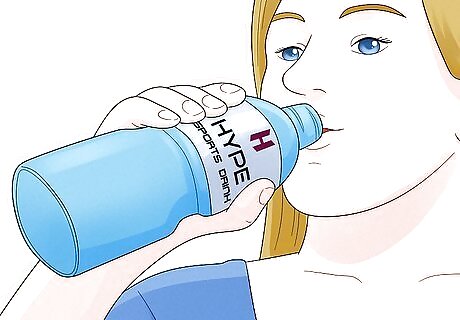
Switch to a diluted sports drink if you’ve been sick for a few hours. If you’ve vomited or had diarrhea over several hours, then you’re probably low on sodium and electrolytes. This puts you at a higher risk for dehydration. Try switching to a sports drink like Gatorade to replace lost electrolytes. However, since sports drinks can be high in sugar, mix it with an equal amount of water first. Older children can have sports drinks too, but give younger children an electrolyte replacement drink like Pedialyte instead. There are also electrolyte replacement ice pops available in supermarkets. This is a good choice for younger children who don’t want to drink the formula.

Avoid milk, caffeine, or alcohol until you’re feeling better. These drinks could all upset your stomach or dehydrate you more. Skip them until your virus passes to avoid any further problems. If you have a serious stomach virus, it’s possible that you’ll have problems tolerating dairy even after the virus passes. This is normal, and should pass within a month.
Eating While You're Sick
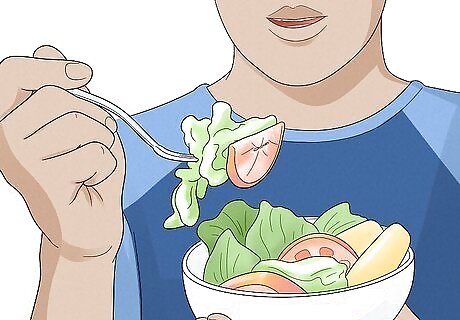
Start eating when you feel up to it. A stomach virus can really zap your appetite, especially if you’ve been vomiting a lot. Don’t force yourself to eat if you’re not feeling up to it. When your nausea improves a little, then you can try to eat again. Remember that you should still be drinking, even if you’re feeling nauseous. It’s more important to get enough fluids than to eat. It’s possible that you’ll still have diarrhea after the nausea and vomiting pass. It’s okay to start eating even if you have diarrhea, as long as you don’t feel like food will make you nauseous. EXPERT TIP Roy Nattiv, MD Roy Nattiv, MD Board Certified Gastroenterologist Dr. Roy Nattiv is a Board-Certified Pediatric Gastroenterologist in Los Angeles, California. With over 20 years of experience he specializes in a broad range of pediatric gastrointestinal and nutritional illnesses such as constipation, diarrhea, reflux, food allergies, poor weight gain, SIBO, IBD, and IBS. He completed his pediatric residency at the Children’s Hospital at Montefiore, Albert Einstein College of Medicine in New York, and his fellowship at the University of California, San Francisco (UCSF). While at UCSF, he was a California Institute of Regenerative Medicine (CIRM) fellowship trainee and was awarded the North American Society for Pediatric Gastroenterology, Hepatology, and Nutrition (NASPGHAN) Fellow to Faculty Award in Pediatric IBD Research. Dr. Nattiv received his undergrad degree from the University of California, Berkeley, and his medical degree (MD) from the Sackler School of Medicine in Tel Aviv, Israel. Roy Nattiv, MD Roy Nattiv, MD Board Certified Gastroenterologist Make sure you're staying well-hydrated with electrolytes, especially if you're not able to tolerate food.
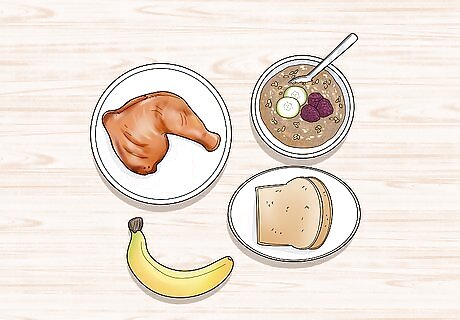
Stick with bland foods to settle your stomach. Even if the nausea is passing, it’s still normal to feel queasy for a few hours or days after the virus is completely gone. To avoid more vomiting, stick with bland, plain foods that are easy to digest. When the queasiness is totally gone, you can switch back to your normal diet. Good foods that shouldn’t make you nauseous include crackers, bread, toast, plain cereal, bananas, rice, and chicken. Stick with these until the queasiness is gone. Avoid fatty or greasy foods, as well as concentrated sweets. Don’t overeat either. Even if you eat bland foods, eating too much could trigger more nausea. Stick with small meals and bites. Understand the details. "This confirmed the facts I thought I knew (such as the BRAT diet) which really helped my recovery." - Linda R. Try a combination of methods. "I tried everything from the BRAT diet, and it helped a lot. I also started to drink slowly, and now I don't struggle moving around." - Kyreece M. Have a story our readers should hear? Share it with 1 billion+ annual wikiHow users. Tell us your story here.
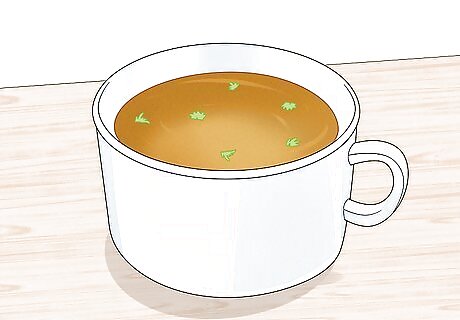
Have broth to help keep yourself hydrated. This is easy to digest and, as an added bonus, helps keep you hydrated as well. If your appetite is coming back, some broth might help you feel better.
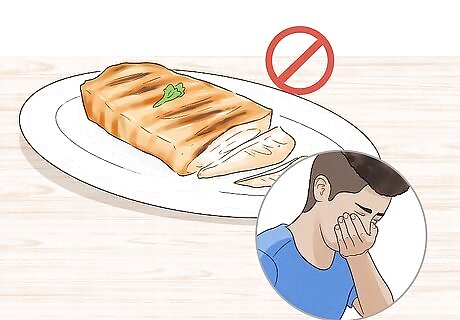
Stop eating if you start feeling nauseous again. It’s normal for your nausea to come back from time to time while you’re recovering, even if you were feeling better. If you’re eating and feel nauseous again, stop eating. This could head off your nausea and prevent further vomiting. You have a better chance of avoiding more nausea if you stick with bland foods like bread or plain rice. When your nausea passes again, try having another meal with these bland ingredients. Keep your portions small as well. If you’re eating too much, your nausea could come back too.
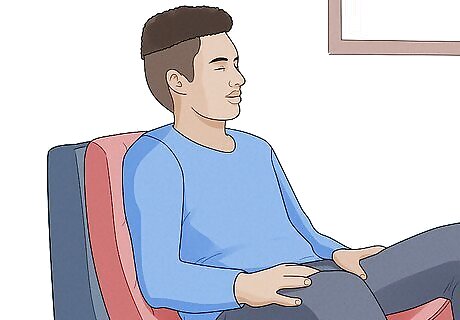
Rest until you’re feeling better. Stomach viruses are extremely draining, and you probably won’t feel like doing much for a few days while you recover. This is fine and normal. Stay home from work or school and take a few days to let the virus pass. In the meantime, keep eating plain foods and drinking plenty of fluids to help yourself get better. In most cases, the worst symptoms of the virus only last 1 day. You can probably start returning to your normal activities the following day, although you’ll still feel pretty run down.
Getting Medical Help
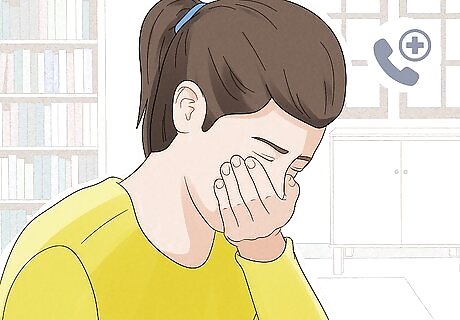
See your doctor if you’ve been vomiting for 2 days. Excessive vomiting could be dangerous, and might be a symptom of a different health issue. If your vomiting hasn’t gotten better within 2 days, then call your doctor and see what you should do next. If your vomiting is so bad that you haven’t kept any liquids down for 24 hours, then call your doctor as well. You’re at a high risk for dehydration. If your baby is sick, call your pediatrician if they’ve been vomiting for a few hours straight.
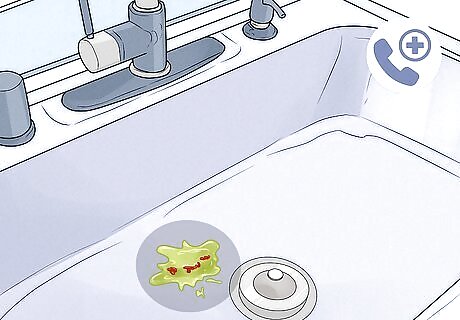
Call your doctor if you see blood in your vomit or stool at any point. These could be serious symptoms, so don’t delay in contacting your doctor. If at any point you see blood in your vomit or stool, even if it’s only once, call your doctor and see what you should do next.
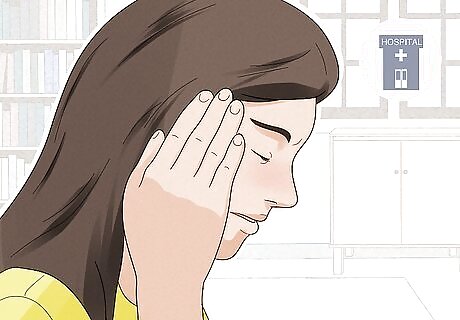
Go to the hospital if you’re showing signs of dehydration. Even if you drink consistently, it’s possible that you’ll still end up dehydrated after a bad stomach virus. If you show signs of dehydration, then go to the emergency room for treatment. The doctors there will give you an IV to hydrate you and get you feeling normal again. Symptoms of dehydration include dark urine, excessive thirst, dry mouth, infrequent urinating, weakness, and dizziness or lightheadedness. An early sign of dehydration is dark yellow urine, so if your urine looks too dark, try to drink more before the dehydration looks worse.
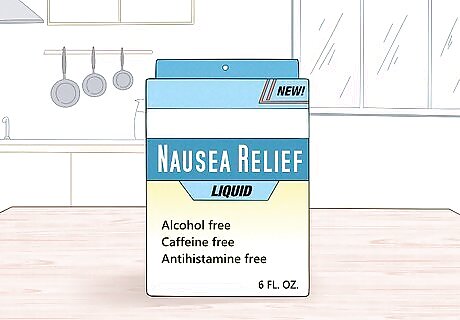
Take anti-nausea or antidiarrheal medication if your doctor tells you to. While these medications may seem like an easy fix, doctors don’t always recommend them if you have a stomach virus. Vomiting and diarrhea are awful to deal with, but they help flush the virus out of your system. If you take medications to stop either of these, the virus won’t pass as quickly. Talk to your doctor and only take medications if they tell you to. Your doctor might also prescribe an antispasmodic to help with stomach cramps. Doctors usually won’t recommend these medications for children. Antibiotics won’t help to get rid of a stomach virus, so doctors won’t even try these. You can also ask about over-the-counter pain relievers like acetaminophen to help if you have pain or fever. However, avoid ibuprofen, which can irritate your stomach.


















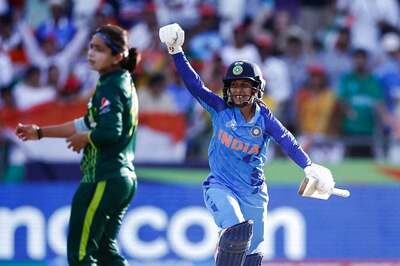
Comments
0 comment